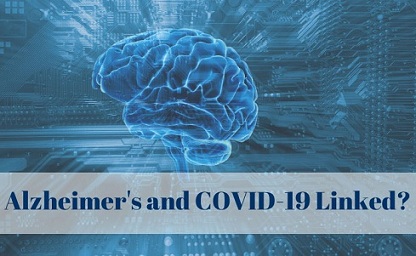BREAKING! Coronavirus News: Cleveland Clinic Study Shows That COVID-19 Infections Can Lead To Alzheimer's Disease-Like Dementia!
Source: Coronavirus News Jun 12, 2021 3 years, 10 months, 2 weeks, 36 minutes ago
Coronavirus News: A new research led by scientists from Cleveland Clinic along with researchers from Case Western Reserve University, Indiana University School of Medicine and Cornell University has identified the mechanisms by which COVID-19 can lead to Alzheimer's disease-like dementia.

To date, dementia-like cognitive impairment is an increasingly reported complication of
SARS-CoV-2 infection but the underlying mechanisms responsible for this complication remain unclear.
According to the study team, a detailed comprehension of the causative processes by which COVID-19 may lead to cognitive impairment is essential for developing preventive and therapeutic interventions.
The team conducted a network-based, multimodal omics comparison of COVID-19 and neurologic complications. They constructed the SARS-CoV-2 virus-host interactome from protein-protein interaction assay and CRISPR-Cas9-based genetic assay results and compared network-based relationships therein with those of known neurological manifestations using network proximity measures.
The study team also investigated the transcriptomic profiles (including single-cell/nuclei RNA-sequencing) of Alzheimer’s disease (AD) marker genes from patients infected with COVID-19, as well as the prevalence of SARS-CoV-2 entry factors in the brains of AD patients not infected with SARS-CoV-2.
The study findings showed significant network-based relationships between COVID-19 and neuroinflammation and brain microvascular injury pathways and processes which are implicated in AD.
The study team also detected aberrant expression of AD biomarkers in the cerebrospinal fluid and blood of patients with COVID-19. While transcriptomic analyses showed relatively low expression of SARS-CoV-2 entry factors in human brain, neuroinflammatory changes were pronounced.
Alarmingly single-nucleus transcriptomic analyses showed that expression of SARS-CoV-2 host factors (BSG and FURIN) and antiviral defense genes (LY6E, IFITM2, IFITM3, and IFNAR1) was elevated in brain endothelial cells of AD patients and healthy controls relative to neurons and other cell types, suggesting a possible role for brain microvascular injury in COVID-19-mediated cognitive impairment. Overall, individuals with the AD risk allele APOE E4/E4 displayed reduced expression of antiviral defense genes compared to APOE E3/E3 individuals.
The study findings suggest significant mechanistic overlap between AD and COVID-19, centered on neuroinflammation and microvascular injury.
The study findings were published in the peer reviewed journal:
Alzheimer's Research & Therapy.
https://alzres.biomedcentral.com/articles/10.1186/s13195-021-00850-3
The study findings indicate an overlap between COVID-19 and brain changes common in Alzheimer's, and may help inform risk management and therapeutic strategies for COVID-19-associated cognitive impairment.
Clinical reports of neurological complications in COVID
-19 patients and "long-hauler" patients whose symptoms persist after the infection clears are becoming more common, suggesting that SARS-CoV-2 (the virus that causes COVID-19) may have lasting effects on brain function. To date however, it is not yet well understood how the virus leads to neurological issues.
Although certain studies suggest that SARS-CoV-2 infects brain cells directly, others found no evidence of the virus in the brain.
Study lead author Dr Feixiong Cheng, PhD from Cleveland Clinic, Genomic Medicine Institute told Thailand Medical News, “
Identifying how COVID-19 and neurological problems are linked will be critical for developing effective preventive and therapeutic strategies to address the surge in neurocognitive impairments that we expect to see in the near future."
The study team harnessed artificial intelligence using existing datasets of patients with Alzheimer's and COVID-19. They measured the proximity between SARS-CoV-2 host genes/proteins and those associated with several neurological diseases where closer proximity suggests related or shared disease pathways.
The study team also analyzed the genetic factors that enabled SARS-COV-2 to infect brain tissues and cells.
Although the study team found little evidence that the virus targets the brain directly, they discovered close network relationships between the virus and genes/proteins associated with several neurological diseases, most notably Alzheimer's, pointing to pathways by which COVID-19 could lead to AD-like dementia.
In order to explore this further, they investigated potential associations between COVID-19 and neuroinflammation and brain microvascular injury, which are both hallmarks of Alzheimer's.
Dr Cheng further explained,"We discovered that SARS-CoV-2 infection significantly altered Alzheimer's markers implicated in brain inflammation and that certain viral entry factors are highly expressed in cells in the blood-brain barrier. These findings indicate that the virus may impact several genes or pathways involved in neuroinflammation and brain microvascular injury, which could lead to Alzehimer's disease-like cognitive impairment."
The study team also found that individuals with the allele APOE E4/E4, the greatest genetic risk factor for Alzheimer's, had decreased expression of antiviral defense genes, which could make these patients more susceptible to COVID-19.
Dr Cheng added, "Ultimately, we hope to have paved the way for research that leads to testable and measurable biomarkers that can identify patients at the highest risk for neurological complications with COVID-19.”
The study team is now working to identify actionable biomarkers and new therapeutic targets for COVID-19-associated neurological issues in COVID long-haulers using cutting-edge network medicine and artificial intelligence technologies.
The study findings help improve the understanding of COVID-19-associated neurological manifestations and provide guidance for future development of preventive or treatment interventions, although causal relationship and mechanistic pathways between COVID-19 and AD need future investigations.
For the latest
Coronavirus News, keep on logging to Thailand Medical News.
